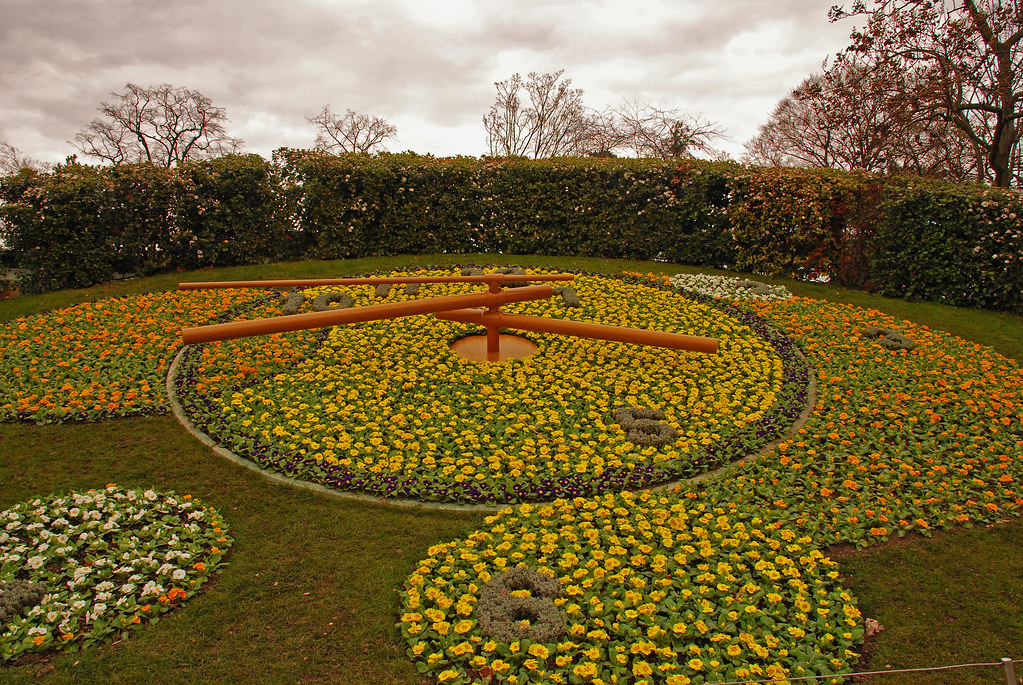Floral Clock, Victoria Square, Christchurch: photo by Greg O'Beirne, 2004
Hortus Botanicus, PARADISUS dictus, alat plantas numerosissimas.
-- Philosophia Botanica: Carl Linnaeus, 1751
6 AM Spotted Cat’s-ear opens
7 AM African Marigold opens
8 AM Mouse-ear Hawkweed opens
9 AM Prickly Sow-thistle closes
10 AM Nippleworth closes
11 AM Star of Bethlehem opens
Noon Passion-flower opens
1 PM Childing Pink closes
2 PM Scarlet Pimpernell closes
3 PM Hawkbit closes
4 PM Small Bindweed closes
5 PM Water-lily closes
6 PM Evening Primrose opens
Linnaeus leaned forward on his hands
in a rhapsody of taxonomy
outside the medical faculty hall at Uppsala University
and knew the hour exactly
simply by glancing down at
the frail town-hall clock
Imagine a universe with at its stem tip five small flowers
Imagine a universe with at its stem tip five small flowers
four encompassing its perimeter
like the four faces of a clock
the fifth pointing straight up at
the sky habitation
of a tidy clockmaker god on whose star circuits this whole vivid time garden was modeled

Floral Clock, Geneva: photo by Sudhanwa Dindorkar, 8 March 2008
How well the skilful gardener drew
Of flow'rs and herbs this dial new;
Where from above the milder sun
Does through a fragrant zodiac run;
And, as it works, th' industrious bee
Computes its time as well as we.
How could such sweet and wholesome hours
Be reckoned but with herbs and flow'rs!
--The Garden: Andrew Marvell




7 comments:
Tom, thanks for the flowers--and "The Garden." I remember reading Marvell so long ago in your class and he's still one I turn to again and again.
"on whose star circuits this whole vivid time garden was modeled"
This is beautiful too.
And the flower timetable with opening and closing times really appeals to me.
Carolus Linnaeus' astonishing hypothetical garden has been a wonderment upon which, in my private dumbfoundry, I have blunted many a dull though over the years, hoping one day to mount this collection of thoughs until I had achieved an actual inclination to thought.
Alas, Opossum Ego; a mere lost mortal wonderer I remain.
No one knows if Linnaeus ever planted or tended the garden he so wonderfully proposed, back then in that great century of the Mind, in his private time, in Uppsala, where one imagines the distractions from his university routines to have been few and far between and imaginary gardening to have been a lovely way to pass the hours. Particularly in winter; though one imagines Linnaeus to have hatched the plan in springtime,with the world beginning to bloom around him out of the grey ruins of northern slush and snow.
The idea of the Horologium Florae appears in his 1751 treatise Philosophia Botanica (whence my epigraph bit is drawn). The first known attempts to put the flower clock idea into practice occurred in several botanical gardens in the early 19th century. Results seem to have been middling at best. The circadian rhythms of plants have been variously observed, but the opening and closing times are necessarily affected by the weather and the seasons, not to mention variations in latitude; so that it is easy to see how this brilliant scheme would be difficult to effectuate and finally come to be filed under Best Laid Plans. But that's not to say the scheme itself is not pure poetry.
The Linnaeus source text, in Latin naturally, is posted online.
Linnaeus' Philosophia Botanica
Hi Tom,
It is always nice when a Swede becomes celebrated outside Sweden (not very common). And Carl von Linné, Linnaeus as you know him, even lived in my hometown Uppsala!
When I was younger I yawned at having to learn all of his botanic classifications, etc at school. But now at 33, I find it fascinating and what a remarkable job Linnaeus did. I am saying this even though I am much more of a Romanticism kind of person than an Enlightenment person.
Great post and beautiful photos!
i think each country has a flower clock like this :D
The gardener's clock! What a great poem. It looks like Linnaeus picked the plants with the very best names? What a poet. Nippleworth. I had to google that one :-)
Taxonomy, itself a kind of poetry, when you think of it.
Post a Comment